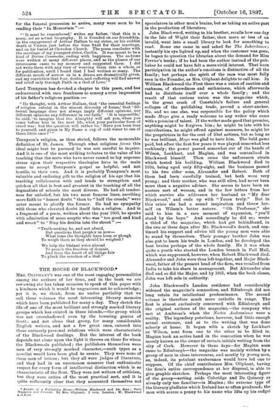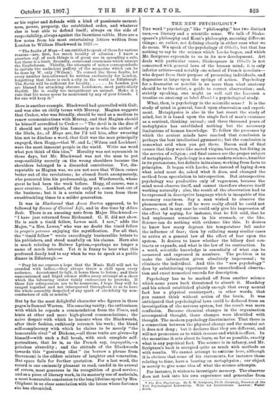THE HOUSE OF BLACKWOOD.*
Mas. OLIPHANT'S was one of the most engaging personalities among the authors of her time, and in the book we are reviewing she has taken occasion to speak of this paper with a kindness which it would be ungracious not to acknowledge; yet it is, we think, from no undue partiality that we call these volumes the most interesting literary memoirs which have been published for many a day. They sketch the life of one of the most brilliant and strongly marked literary groups which has existed in these islands,—the group which was not overshadowed even by the towering genius of Scott ; and not alone that group, for many considerable English writers, and not a few great ones, entered into those curiously personal relations which were characteristic of the Blackwood dealings. But the interest of the book depends not alone upon the light it throws on those for whom the Blackwoods published ; the publishers themselves were men of very strongly marked character,—such types as a novelist would have been glad to create. They were none of them men of letters ; but they all were judges of literature, and they had in an uncommon measure that enthusiastic respect for every form of intellectual distinction which is so characteristic of the Scot. They were not writers of criticism, but they were critics of the most practical sort, and it is quite sufficiently clear that they accounted themselves not • Annal, of a Publishing House—William Blackwood and his Bons: their Maoasins and Friends. By Mrs. Oliphant. 2 vols. London : W. Blackwood a la Suns
speculators in other men's brains, but as taking an active part in the production of literature.
John Blackwood, writing to his brother, recalls how one day in the Isle of Wight their father, then more or less of an invalid, went into a small library to look for something to read. Some one came in and asked for The Inheritance ; instantly his eye lighted up, and when the customer was gone, be began to question the librarian about the demand for Miss Ferrier's books ; if he had been the author instead of the pub- lisher be could not have felt a more vivid interest. That keen participation in the author's emotions is distinctive of all the family; but perhaps the spirit of the race was most fully seen in the Founder, as Mrs. Oliphant delights to call him. In William Blackwood the First there was a union of caution and rashness, of shrewdness and enthusiasm, which afterwards bad to distribute itself over a whole family ; and the result of that curious union was the magazine which,, in the great crash of Constable's failure and general collapse of the publishing trade, proved a sheet-anchor. He, and no one else, was responsible for the policy which made Maga give a ready welcome to any writer who came with a promise of talent. If the writer made good that promise, anything might be forgiven him ; he might be late with his contributions, he might offend against manners, he might let the proprietors in for the cost of libel actions, but 80 long as he was brilliant, Maga was glad to have him. The bold game paid, but after the first few years it was played somewhat less recklessly; the power passed somewhat out of the hands of Wilson, Lockhart, and Maginn, and was centralised in Blackwood himself. Then came the unforeseen strain which tested his building. William Blackwood died in 1834, being aged only fifty-eight, and the business passed to his two elder sons, Alexander and Robert. Both of them had been carefully trained, but both were very young; and their mother, who was still alive, had never been more than a negative adviser. She seems to have been an austere sort of woman, and in the few letters from her which survive she addresses her husband as "My dear Blackwood," and ends up with "Yours truly." But in this crisis she had a sound inspiration and threw her- self on Wilson's better nature. "Oh Professor," she said to him in a rare moment of expansion, "you'll stand by the boys." And accordingly he did so ; wrote a third of the magazine, which had got behindhand, in the two or three days after Mr. Blackwood's death, and con- tinued his support and advice till the young men were able to stand by themselves. Their younger brother John was also put to learn his trade in London, and he developed the best brains perhaps of the whole family. He it was when quite a youth who started the London branch in Pall Mall, which was suppressed, however, when Robert Blackwood died. Alexander and John were thus left together, and Major Black- wood, father of the present head of the firm, was recalled from India to take his share in management. But Alexander also died and so did the Major, and by 1861, when the book closes, John was left sole in authority.
John Blackwood's London residence had considerably widened the magazine's connection, and Edinburgh did not long retain its intellectual predominance. The second volume is therefore much more catholic in range. The first is almost exclusively concerned with Edinburgh and the original authors of the magazine,—the company who met at Ambrose's when the Noctes Ambrosiame were a reality. The legendary potations. however, had little enough actual existence, and as to the writing that was done soberly at home. It began with a sketch by Lockhart or Wilson, sent from one to the other to be filled in. Maginn took an active hand in the concoction when he was merely known as the owner of certain initials writing from the city of Cork. However in these days—for Maginn soon came to Edinburgh—the magazine was mainly written by a, group of men in close intercourse, and mostly by young men, as, indeed, its petulant exuberance would have led one to suppose. Of the chief contributors Mrs. Oliphant, having the firm's entire correspondence at her disposal, is able to give graphic sketches. Perhaps the most interesting figure of the group—setting aside Coleridge and De Qnincey as already only too familiar—is Maginn; the extreme type of the literary gladiator which Ireland has so often produced ; the man with scarce a penny to his name who lifts up his cudgel
or his rapier and defends with a kind of passionate earnest- ness, power, property, the established order, and whatever else is best able to defend itself; always on the side of respectability, always against the licentious rabble. Here are a few notes from his most entertaining letters written from London to William Blackwood in 1823 :—
" The faults of Maga—I am entitled to speak of them for various reasons—are, first, too much locality of allusion : I know a quantum suf. of such things is of great use in spreading a sale, but there is a limit. Secondly, occasional coarseness which annoys the Englishman. Thirdly, the attempts of minor correspondents to imitate the audacious puffery of the magazine which can be be done by W. only [Wilson]. To correct the three faults, let every number henceforward be written exclusively for London, forgetting that there is such a city in the world as Edinburgh. The Noctes will be sufficient for locality In London you are blamed for attacking obscure Londoners, most particularly Hazlitt. He is really too insignificant an animal. Make it a rule that his name never be mentioned by any of your friends. I for one will keep it."
Here is another example. Blackwood had quarrelled with Galt, and was also on chilly terms with Murray. Magian suggests that Croker, who was friendly, should be used as a medium to renew communications with Murray, and that Maginn should be himself accredited to Croker " The devil is in the dice if I should not mystify him famously as to who the author of
the libels, &c., of Maga are, for I'd tell him, after swearing him not to disclose a word, that Galt was the man principally
engaged, then Hogg,—that W. and L. [Wilson and Lockhart] were the most innocent people in the world. Write me word what you think of this idea." Morality was not squeamish in those days, but Mr. Blackwood was not the man to put responsibility secretly on the wrong shoulders because the shoulders belonged to a discarded contributor. Yet, dis- reputable as Maginn was, we are not sure that Wilson comes better out of the revelations; he abused Scott anonymously, who procured him his professorship, and Wordsworth, whose guest he had been the week before. Hogg, of course, was a poor creature. Lockhart, of the early set, comes best out of the business ; but it is a certain relief to turn from these swashbuckling times to a milder generation.
It was in Blackwood that Amos Barton appeared, to be followed by Scenes of Clerical Life, and in due time by Adam Bede. There is an amusing note from Major Blackwood :— "I have just returned from Richmond. G. E. did not show. He is such a timid fellow, Lewes said. I saw," adds the Major, "a Mrs. Lewes," who was no doubt the timid fellow in propria persona enjoying the mystification. For all that, the "timid fellow" wrote exceedingly businesslike letters to his publishers, and stood manfully on his claims. Here also is much relating to Bulwer Lytton,—perhaps no longer a name of much interest. Yet it is funny to hear what this professed dandy had to say when he was to speak at a public dinner in Edinburgh :— " Pray let me express a hope that the Music Hall will not be crowded with ladies,—they always throw a chill upon every audience. Accustomed to talk, it bores them to listen ; and their unaccustomed and frigid silence stifles every attempt at a cheer which the labouring orator vainly endeavours to provoke. If these fair refrigerators are to be numerous, I hope they will be ranged together and not interspersed throughout so as to have the whole assembly despoiled of any spark of electricity by non- conductors of silk or muslin."
But by far the most delightful character who figures in these pages is Samuel Warren. His amazing vanity; the enthusiasm
with which he repeats a commendation from the Times, and hints at other and more high-placed commendations ; the naïve despair with which he laments when the Blackwoods, alter their fashion, ruthlessly retrench his work ; the bland self-complacency with which he claims to be merely "the honourable rival" of Dickens,—all these traits are given—by himself—with such a full brush, with such complete self- portraiture, that he is, as the French say, impayable,—a
priceless absurdity ; and the attitude of the Blackwoods towards this "gesturing idiot" (to borrow a phrase from Stevenson) is the oddest mixture of laughter and veneration.
But space fails for further quotation. For a last word, the record is one eminently pleasant to read, candid in its avowal of errors, most generous in its recognition of good service; and as a piece of literary work, in its masterly use of materials, a most honourable conclusion to the long lifetime spent by Mrs. Oliphant in so close association with the house whose fortunes she has chronicled.







































 Previous page
Previous page